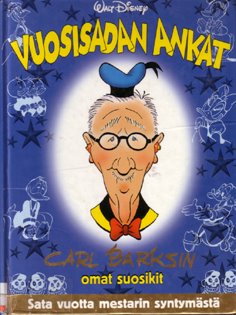
I've promised elsewhere that I'd write something about the legendary Disney and duck artist, Carl Barks. I've always considered him to be one of the best five comic artists ever in the whole world.
I was reading a book that has been made only for the Finnish audience (if I understood correctly) that commemmorates Barks's 100th birthday - it's a book with Barks's own favourite Duck stories. It's a telling book: an artist doesn't always know what's best for him. I mean, the stories are great, but they are not the best stuff Barks made. Missing are almost completely the Chekhovian short stories about the everyday life of Donald Duck and his nephews, Scrooge McDuck and especially Gladstone Gander. In these stories Barks was at his grimmest and comes close to the noir atmosphere: people (or the ducks, actually) are haunted by their past deeds and they don't really know who they are and their identities shift in every possible occasion.
I don't know why this was, but Barks's best stories - at least to me - were made in the early fifties. Maybe it was the Korean war paranoia (about which Woody Haut talks about in his delightful Pulp Culture) that made the anger and bitterness rise to fore in Barks's stuff in the early fifties. David Cochran should've used Barks's stories as an example in his book, America Noir.
The stories that came after this are naïve at best. In the book we have the story "Micro-Ducks from Outer Space" from 1966. It's a fast-moving adventure, but the premise is downright stupid: it's announced in the morning that the sceptics' club gives away billion dollars to anyone who presents a real UFO and immediately everyone's crazy about it, shouting at skies and pleading the aliens to come down. The same goes for the stories in which Donald Duck manages in every profession he tries - the scheme gets boring after a few stories.
This said, I cannot but admire Barks's knack for building up atmosphere, mood and even straight horror. I need only name "The Old Castle's Secret", which, if it were a movie, would be in the pantheon. Economic storytelling at its best. Barks's best secret - namely, how to draw psychologically plausible facial and bodily expressions - is here already at top form, even though this is one of his earliest and the second one with Scrooge McDuck.
(I was rather disappointed to read from a interview in the web (I can't find it anymore, sorry!) that Barks was against the US taking part in the WWII. Lucky they got Roosevelt in the lead.)
No comments:
Post a Comment